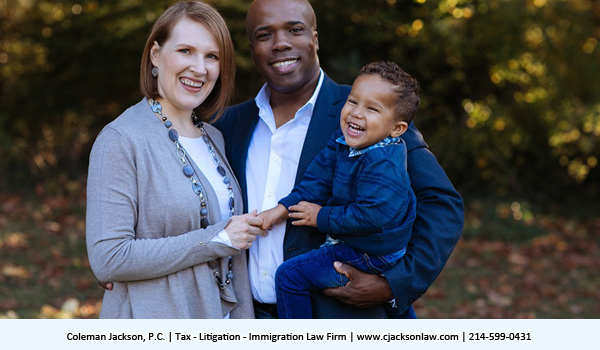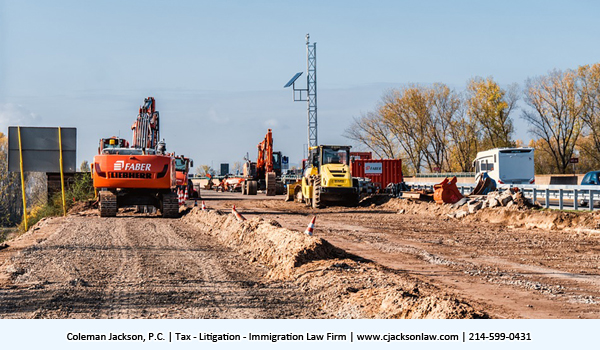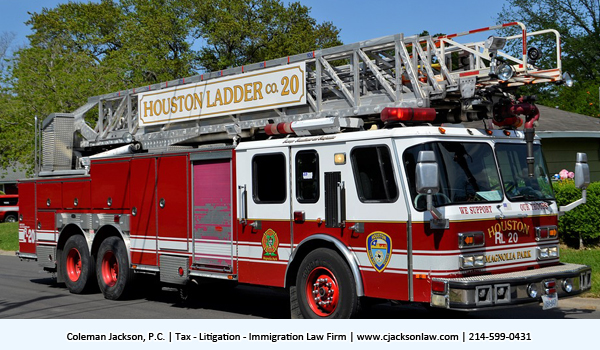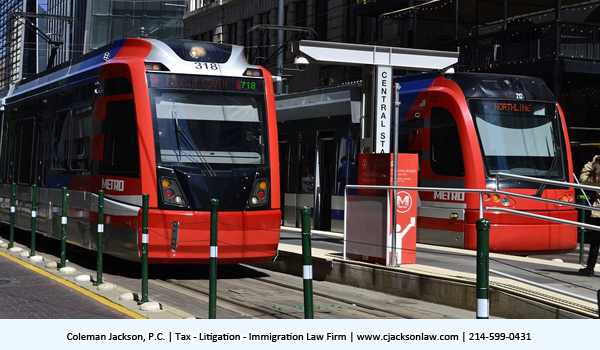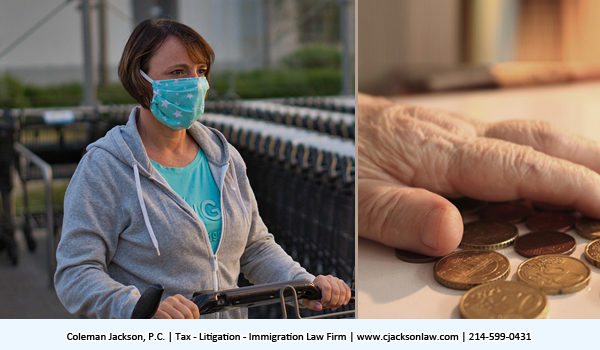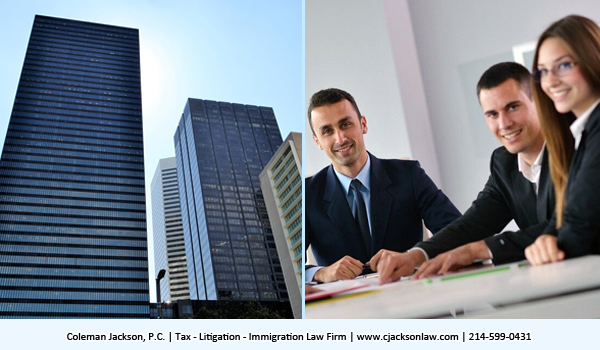Coleman Jackson, P.C. | Transcript of Legal Thoughts Podcast
Published March 29, 2021.
Legal Thoughts is a podcast presentation by Coleman Jackson, P.C., a law firm based in Dallas, Texas serving individuals, businesses, and agencies from around the world in taxation, litigation and immigration legal matters.
This particular episode of Legal Thoughts is a podcast where the Attorney, Coleman Jackson is being interviewed by Reyna Munoz, Immigration Legal Assistant of Coleman Jackson, P.C. The topic of discussion is “Immigration Matters You Ought to Know About: Undocumented Immigrants and the I-601 and I-601A Unlawful Presence Waivers”. You can listen to this podcast by clicking here:
You can also listen to this episode and subscribe to Coleman Jackson, P.C.’s Legal Thoughts podcast on Apple Podcast, Google Podcast, Spotify, Cashbox or wherever you may listen to your podcast.
TRANSCRIPT:
ATTORNEY: Coleman Jackson
Legal Thoughts
COLEMAN JACKSON, ATTORNEY & COUNSELOR AT LAW
ATTORNEY: Coleman Jackson
Welcome to Immigration Thoughts
- My name is Coleman Jackson, and I am an attorney at Coleman Jackson, P.C., a taxation, litigation, immigration law firm based in Dallas, Texas.
- Our topic for today is: Immigration Matters You Ought to Know About: Undocumented Immigrants and the I-601 and I-601A Unlawful Presence Waivers. Other members of Coleman Jackson, P.C. are Yulissa Molina, Tax Legal Assistant, Reyna Munoz, Immigration Legal Assistant, Leiliane Godeiro, Litigation Legal Assistant and Mayra Torres, Public Relations Associate.
- On this “Legal Thoughts” podcast our immigration legal assistant, Reyna Munoz, will be asking the questions and I will be providing the answers to the questions on this very important immigration topic: Immigration Matters You Ought to Know About: Undocumented Immigrants and the I-601 and I-601A Unlawful Presence Waivers.
Interviewer: Reyna Munoz, Immigration Legal Assistant
- Attorney, thank you for joining me today and for taking the time to discuss the Application for Waiver of Grounds of Inadmissibility, I 601 and the Application for Provisional Unlawful Presence Waiver, I 601A.
Question 1:
Attorney, can you tell me, what is the I 601 and the I 601A waiver?
Attorney Answers Question 1:
- Sure Reyna. A lot of immigrants in Texas came to the U.S. undocumented; therefore, they need a Waiver of Unlawful Presence. many undocumented immigrant parents waste their money when their U.S. citizen children turn 21. They waste their money because although they can successfully get their I-130, Petition for Alien Relative petition approved, their U.S. citizen children do not qualify for the U.S. person who will suffer extreme and unusual hardship if the undocumented immigrant is not granted an I-601 waiver for unlawful presence in the U.S. Bottom line, it’s a waste of money to file an I-130 when you do not have a qualifying relative to satisfy Form I-601, Application for Waiver of Grounds of Inadmissibility based on the unlawful presence ground of inadmissibility. The undocumented immigrant needs a qualifying relative who will suffer extreme hardship if the undocumented immigrant is not permitted to immigrate to the United States. The extreme hardship requirement for a waiver of unlawful presence can only be satisfied by a qualifying relative, such as, a U.S. citizen parent or U.S. citizen spouse. Repeat, U.S. citizen children do not and cannot satisfy the qualifying relative requirement; therefore, unless the undocumented immigrant has a qualifying relative, it is a waste of time, effort, and money for their 21-year-old child to file an I-130, Petition for an Alien Relative on their behalf if the intent is to get a Green Card through the child. A big log or bolder is blocking the road for the undocumented immigrant seeking a Green Card through their 21-year-old child. The parents need a qualifying relative! If they had a qualifying relative, the parents probably would have gotten their Green Cards years ago.
- Form I-601A, Provisional Waiver of Unlawful Presence is a waiver request based on humanitarian concerns of immigrants leaving the U.S. who are barred from returning for 5 to 10 years due to the fact that they have spent more than 180 continuous days unlawfully in the U.S. Before the I-601A provisional waiver process was implemented, these parents and other undocumented immigrants would leave the U.S. without an I-601 Waiver and when they got to the Consulate in their home country, they learned that they needed a waiver of unlawful presence to return to the United States. The waiver was typically then prepared in the foreign country and submitted for approved by the U.S. Consulate Office. Often times the Consulate would deny the waiver and therefore the immigrant would get stuck for 5 to 10 years in their home country with their husband, or wife and children remaining up here. Family separation occurred as an inherent feature of the immigration waiver process. The Form I-601A was created to hopefully prevent this harsh family separation reality. Form I-601A can only be used to request waiver for unlawful presence. It cannot be used to request a waiver or pardon for any other reason of inadmissibility of the undocumented immigrant. For example, if there are crimes in the immigrants’ background or medical or health issues, DUI issues, Domestic Violence issues or other inadmissibility issues with the immigrant, the I-601A waver cannot be used for these grounds of inadmissibility.
Interviewer: Reyna Munoz, Immigration Legal Assistant
- Thank you for this detailed explanation Attorney. You’re correct, a lot of times undocumented people think that once their child turns 21, they will immediately be able to apply for a green card, but it is important for them to understand that this is a process and they need a qualifying relative who suffer extreme and unusual hardship in the event the undocumented immigrant leaves the U.S. and is not permitted to return for 5 to 10 years.
Question 2:
Attorney, what are the differences between the I 601 and the I 601A?
Attorney Answers Question 2:
- The I 601 waiver is used to request waiver or pardon for a host of areas of inadmissibility, such as, unlawful presence, physical or mental health (such as, DUI, domestic violence could be considered by some Consulate Officers as indications of mental illness); whereas, the I 601A provisional waiver can only be used to request a pardon for unlawful presence in the U.S. Inadmissibility based on mental health, physical health, crimes, or other grounds of inadmissibility are not eligible for consideration in an I 601A waiver case.
- The I 601 waiver is granted to pardon numerous offending grounds of inadmissibility; whereas the I 601A waiver is a provisional waiver of unlawful presence.
- The I 601 waiver is typically filed at the U.S. Consulates Office by undocumented immigrants seeking a green card through a qualifying relative; whereas, the I-601A provisional waiver of unlawful presence is filed inside the U.S. before the immigrant leaves the United States. It is provisional in the sense that the Consulate Officer will make the final determination as to whether the immigrant is admitted to return to the United States.
Interviewer: Reyna Munoz, Immigration Legal Assistant
- It sounds like the these understanding the use and purpose of these two forms and this whole area of immigration waiver law are incredibly important topics for many immigrants residing in Texas and throughout the Southwest.
Question 3:
Who can file an I 601, Application for Waiver of Grounds of Inadmissibility?
Attorney Answers Question 3:
- Reyna, the following types of immigrants may file Form I 601, Application for Waiver of Inadmissibility:
- Those applying for adjustment of status
- Those applying for Temporary Protected Status, TPS
- Those who are applying for adjustment of status under the Nicaraguan Adjustment and Central American Relief Act
- Those who are applying for an immigrant visa or adjustment of status under Violence Against Women’s Act (VAWA), And finally,
- Special Immigrant Juveniles who have an approved I 130, Petition for Alien Relative.
Interviewer: Reyna Munoz, Immigration Legal Assistant
Question 4:
Thank you for that detailed list, attorney. Now tell me, who is eligible to file the I 601A, Provisional Unlawful Presence Waiver??
Attorney Answers Question 4:
- Reyna, those eligible to file the I 601A Provisional Waiver for Unlawful Presence must meet the following requirements:
- They must be physically present in the United States at the time of filing;
- They must be least 17 years of age or older;
- They must have a case pending with the United States Department of State because they are: (A) the principal beneficiary of an approved I-130 or they are the beneficiary of an approved I 360; or (B) they are the spouse or child of a principal beneficiary of an approved immigrant visa and have paid the immigrant visa processing fee; or (C) they have been selected by the Department of State to participate in the Diversity Visa program; and
- They must be able to demonstrate that denying admission to the United States would result in extreme hardship to a relative U.S. citizen spouse or U.S. citizen lawful permanent resident or parent.
Interviewer: Reyna Munoz, Immigration Legal Assistant
Question 5:
Attorney, in regard to the I 601A you mentioned “extreme hardship,” what exactly does this term mean in U.S. immigration law?
Attorney Answers Question 5:
- That is correct, Reyna. The applicant must demonstrate that being denied the entrance back into the United States will cause extreme hardship to their qualifying relative. Some of the areas of the qualifying relative’s life that might be relevant in support of an I-601 or I-601A, Application for Waiver to overcome unlawful presence ground of inadmissibility are:
- Education: Disruption of current academic programs or loss of opportunity for higher education due to lower quality education in home country;
- Personal considerations: Such as separation for close relatives in the United States
- Financial considerations: Cost of caring for family members or loss of job
- Health of the qualifying relative: Ongoing medical treatments in the United states
- Special Considerations: fears of persecution or cultural differences in home country
- Keep in mind that the U.S. citizen relative must prove that they will suffer extreme financial hardship if their immigrant relative is not allowed back into the country. The hardship must be more than the mere normal and expected financial difficulty derived from lack of the undocumented immigrants earned income, family relations or household support. The hardship that might be experienced by the undocumented immigrant or their children are not factors that the adjudicators typically would consider when evaluating waiver cases. Even when a qualifying relative meets the extreme hardship requirement, it simply means the adjudicator of the waiver application can exercise discretion and grant the waiver. It is not mandatory that the waiver be granted even when extreme hardship is clearly shown.
Interviewer: Reyna Munoz, Immigration Legal Assistant
- Attorney thank you for summarizing what term “extreme hardship” means in the unlawful presence waiver context. This is such an important fact and potential hurdle for all immigrants who must meet the extreme hardship requirement to overcome the unlawful presence ground of admissibility.
Question 6
Attorney, my final question regarding the unlawful presence waiver is this: Is there a filing fee for Form 1 601 and Form I 601A?
Attorney Answers Question 6:
- Yes Reyna, there is a USCIS filing fee for both of these forms.
- As of March 11, 2021, the filing fee for the I 601, Application for Waiver of Grounds of Inadmissibility is $930 and the filing fee for the I 601 A, Application for Provisional Unlawful Presence Waiver is $630.
- USCIS filing fees are subject to change with little notice.
Reyna Munoz’s Concluding Remarks:
- Attorney, thank you for the detailed information on both the Application for Waiver of Grounds of Inadmissibility, I 601 and the Application for Provisional Unlawful Presence Waiver, I 601A. Unlawful presence in the U.S. is a hurdle facing many immigrant families throughout Texas and the Southwest in general. This information may prevent them from spending their hard-earned money unwisely. I mean, if they don’t have a qualifying relative in the U.S. for the unlawful presence waiver; that sounds like a big problem. I mean that is a huge problem, Attorney! Like you said, its like a big log or bolder stretching across the road blocking the path to a Green Card for people who have been here for a while undocumented.
- Our listeners who want to hear more podcast like this one should subscribe to our Legal Thoughts Podcast on Apple Podcast, Google Podcast, Spotify or wherever they listen to their podcast for more taxation, litigation and immigration Legal Thoughts podcasts. Everybody take care! Read our taxation, government contract litigation and immigration law firm’s blogs at www.cjacksonlaw.com. Coleman Jackson, P.C., is located right here in Dallas, Texas at 6060 North Central Expressway, Suite 620 Dallas, Texas 75206.
- English callers: 214-599-0431 | Spanish callers: 214-599-0432. Portuguese callers: 214-272-3100.
Attorney’s Concluding Remarks:
THIS IS THE END OF “LEGAL THOUGHTS” FOR NOW
- Thanks for giving us the opportunity to inform you about Immigration Matters You Ought to Know About: Undocumented Immigrants and the I-601 and I-601A Unlawful Presence Waivers
- Immigrants who have resided in the United States for more than 180 days continuously without lawful status has a major problem under current immigration law. They need a waiver or pardon for unlawful presence when they leave the U.S. in order to lawfully reenter the U.S. That in a nutshell is what the I- 601 and I-601A waivers are designed to accomplish as far as unlawful presence is concerned. This is the current state of immigration law in the United States as it pertains to undocumented immigrants and current waiver unlawful presence.
- If you want to see or hear more taxation, government contract litigation and immigration LEGAL THOUGHTS from Coleman Jackson, P.C. Stay tuned! We are here in Dallas, Texas and want to inform, educate and encourage our communities on topics dealing with taxation, government contract litigation and immigration. Until next time, take care.


